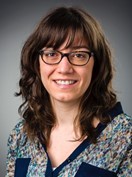Member Spotlight - Raquel Bartolomé Casado, PhD
3/24/2022
Short biography and personal statement
Raquel Bartolomé Casado, PhD
Raquel is interested in studying the immune cells that are permanently lodged in the human intestinal mucosa.
Raquel obtained her degree in Biotechnology at the University of Salamanca and completed her MSc studies at the Cancer Research Center in Salamanca (Spain). While working on her MSc project, she realized a research stay at the lab of Prof. Fritjof Lund-Johansen at the University of Oslo, where she acquired experience in novel multiplex bead-based immunoassays for large scale proteomic analysis. Then, Raquel went on to do her PhD in Prof. Frode Jahnsen’s lab at the Faculty of Medicine, University of Oslo. Her PhD work was focused on the longevity of the adaptive immune cell compartment in the human small intestine, with a special focus on characterizing resident memory CD8+ and CD4+ T cells. Raquel’s track record as a graduate student was outstanding, with two first-author papers, one in Journal of Experimental Medicine and another one in Mucosal Immunology as well as several co-authorships. In recognition of her research work, Raquel received the 2019 International Congress of Mucosal Immunology Rising Stars Award, and she was awarded the prestigious “HM King's gold medal” (Hans Majestet Kongens gullmedalje) for the best PhD Thesis at the Faculty of Medicine, University of Oslo in 2021.
Raquel obtained a Three-year Researcher Project grant with International Mobility from the Research Council of Norway and joined the Teichmann lab at Wellcome Sanger Institute (Cambridge, UK) in June 2021. During her postdoctoral training, she is currently investigating the development and long-term maintenance of resident memory T cells in the human gut using single-cell multi-omics approaches.
Describe your most recent work in the field of Mucosal Immunology.
Dr. Bartolomé Casado's main research interest is the study of immunological memory in the human gut. In her main body of work, from her PhD studies, she focused on investigating the longevity of the adaptive immune cells (CD8+ T cells, CD4+ T cells, regulatory T cells and plasma cells) in the human small intestine.
Resident memory T (TRM) cells have been well-described in mice, but studies in humans are still limited. By analysing the persistence of donor cells in intestinal grafts, Raquel and colleagues identified truly resident T cells and demonstrated that CD8+ and CD4+ TRM were retained in the duodenal mucosa for at least one year. This was a remarkable finding, especially because studies in mice have shown that the CD4+ T cells are relatively short-lived. Furthermore, Raquel and colleagues applied this unique human transplant model to examine intestinal Tregs, and they identified two Treg subpopulations, distinguished by Helios expression, with different phenotype, lifespan, and functions. In addition, Dr Bartolomé-Casado contributed to demonstrating that plasma cells are extremely long-lived in the human gut, a fraction of them presenting a lifespan of two decades. The work of Raquel and colleagues overturn many of the pre-conceptions related to the longevity of mucosal T and B cell populations and have huge implications for the development of mucosal vaccines. In addition, the knowledge that the adaptive immune system in the human gut is very stable over time has therefore important consequences for the treatment of intestinal inflammatory disorders.
Upcoming projects
In her postdoctoral studies, Dr Bartolomé-Casado chose to study the niches and developmental pathways for the generation and long-term maintenance of resident memory T cells in the human intestine. She is applying integrative approaches including, transcriptomics, epigenomics and immune repertoire analysis at the single-cell level to characterize the different intestinal T cell populations at the steady-state. Raquel is currently working at the Wellcome Sanger Institute in Cambridge at the group of Prof. Sarah Teichmann, who is a co-founder of the Human Cell Atlas Consortium. From June 2023, Raquel will return to Oslo to continue her scientific career.
Links:
https://www.med.uio.no/klinmed/english/people/aca/raquelb/
https://www.sanger.ac.uk/person/bartolome-casado-raquel/
https://orcid.org/0000-0002-8966-9047
Twitter: @RBartolom





